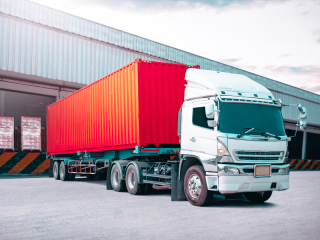
The UK Government has confirmed its diesel HGV ban with the pledge to ban the sale of new non-zero-emission heavy goods vehicles (HGVs) by 2040, as part of its wider plan to decarbonise domestic transport by 2050. This move will see the end of new diesel and petrol-powered HGVs over 26 tonnes by 2040, with smaller HGVs under 26 tonnes phased out by 2035.
This policy is designed to address one of the most pressing challenges in transport. Although HGVs make up only a small proportion of vehicles on UK roads, they account for around 5% of total greenhouse gas emissions.
The ban is ambitious, and while it signals a clear direction for the haulage and logistics sector, with alternative fuel HGVs being poised as the solution, it raises important questions about how fleets can adapt in practice.
Why the diesel HGV ban matters
HGVs are essential to the UK economy, transporting goods across supply chains and keeping shelves stocked and consumers happy. Yet, their reliance on diesel makes them a major contributor to air pollution and carbon emissions. By committing to a zero-emission future, the Government aims to balance sustainability targets with economic resilience.
But the transition will not be simple.
Fleets will need to navigate significant challenges, including technology availability, infrastructure readiness, and the financial impact of upgrading vehicles. But the opportunities are equally significant, from cost savings on fuel to improved air quality in urban areas and the reputational benefits of leading in sustainability.
Alternative fuel HGVs
Hydrogen-powered HGVs
Hydrogen is a leading contender for decarbonising heavy transport. Hydrogen fuel cells produce only water vapour at the tailpipe, making them one of the cleanest alternatives to diesel. They also offer practical advantages for fleets, including faster refuelling times and longer ranges compared to battery-electric options.
Industry experts believe hydrogen is especially suited to long-haul HGVs, where downtime and payload limitations can make battery solutions less practical. While the technology is still in development and refuelling infrastructure remains limited, trials are underway across the UK and Europe to test its viability at scale.
Battery-electric HGVs
Battery power is also advancing rapidly. Electric HGVs are already being developed by major manufacturers, with some capable of covering hundreds of miles per day. Depot-based charging solutions make them attractive for fleets operating on fixed routes.
As battery costs fall and public charging networks expand, electric HGVs are expected to become increasingly cost-effective. The Government has unveiled new public chargepoint designs and invested in funding to accelerate deployment, signalling a commitment to make EV charging accessible and reliable nationwide.
Is the diesel HGV ban target realistic?
Despite progress, the industry faces challenges. Currently, just 0.2% of HGVs on UK roads are alternatively fuelled. The cost of new vehicles, limitations in charging and refuelling infrastructure, and the need for clear policy frameworks all raise concerns about whether the 2040 ban is achievable.
Some have questioned whether the deadline needs more flexibility. For instance, large-scale adoption of hydrogen and electric HGVs will depend on significant investment in infrastructure. Without it, fleets risk being left with few workable options.
Nevertheless, the Government remains firm in its target, viewing it as essential for meeting wider net-zero commitments. For businesses, the message is clear: planning for the transition must start now.
What can HGV fleets do today?
While 2040 might feel distant, the transition is already underway. Fleets that act early will be better prepared to adapt and spread the cost of change over time.
Practical steps include:
Exploring EV-ready fuel cards: At Right Fuel Card, we offer products such as the BP Fuel & Charge Card and Shell Fuel & EV card. These allow drivers to refuel with diesel or petrol while also accessing the UK’s growing EV charging network, providing flexibility during the transition period.
Investing in vehicle maintenance: Keeping diesel HGV fleets efficient and well-maintained reduces emissions now and lowers running costs while new technologies mature. Maintaining your current fleet for as long as possible also means delaying purchasing a new diesel HGV for as long as possible.
Considering service and maintenance plans: Structured plans can help extend vehicle lifespan and reduce the risk of costly breakdowns as fleets plan their next investment cycle.
Training drivers and fleet managers: Preparing staff for future vehicle technologies, charging routines, and efficient driving practices is key to long-term success.
Phasing the transition: short-haul first, long-haul later
For many fleets, the road to 2040 will not be a single step but a phased journey. Different use cases will require different solutions:
Short-haul, depot-based operations: Electric HGVs are already a practical option for fleets with predictable, repeatable routes where depot charging is possible. These operations can start transitioning earlier, benefiting from lower running costs and reduced emissions.
Urban deliveries: Cities are introducing clean air zones and low-emission restrictions, making electric and hydrogen vehicles increasingly advantageous for urban deliveries. Moving to zero-emission options here first helps fleets remain compliant and future-proof.
Long-haul freight: For longer routes, hydrogen may prove to be the more viable solution due to its faster refuelling times and longer range. These applications are likely to be adopted later, once infrastructure is developed at scale.
This phased approach allows fleets to gradually integrate zero-emission vehicles while still relying on diesel where alternatives are not yet viable.
How Right Fuel Card supports the HGV fuel transition
We understand that the 2040 ban is both a challenge and an opportunity. Our fuel card solutions are designed to give businesses the flexibility they need today, with future-ready options for tomorrow. Whether your fleet is still diesel-only, experimenting with electric vehicles, or planning a phased transition, we can help you manage fuel costs, streamline payments, and gain visibility over your spend.
With EV-inclusive fuel cards, competitive fixed weekly pricing, and access to one of the UK’s largest fuel station networks, we provide the tools you need to keep your fleet moving while planning for a low-carbon future.
The road ahead
The UK’s HGV diesel ban is one of the most ambitious steps towards net zero yet. While there are hurdles to overcome, the direction is clear: the haulage industry must prepare for a zero-emission future. Hydrogen and battery-electric technology will play central roles, supported by new infrastructure and Government policy.
For businesses, the time to act is now. Fleets that embrace change early will not only future-proof their operations but also unlock immediate benefits in cost savings, efficiency, and sustainability.
At Right Fuel Card, we’re here to help you navigate that journey. Whether you’re looking for flexible EV fuel cards, guidance on managing your fleet, or ways to keep costs under control today, we’re ready to support your next steps.




